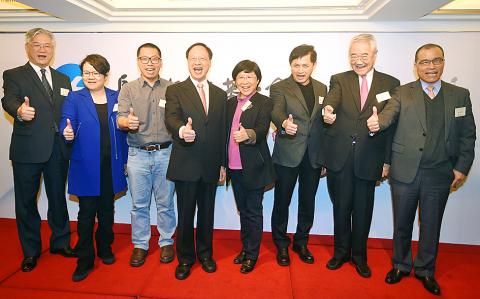Former premier Jiang Yi-huah (江宜樺) yesterday announced the establishment of a foundation aimed at seeking a “way out” for Taiwan and linking Taiwanese youths with the international community.
He denied that the move was a precursor to staging a political comeback.
With Jiang as president, the newly founded Fair Winds Foundation’s board of directors includes many former Cabinet members of former president Ma Ying-jeou’s (馬英九) administration, including former minister of Mainland Affairs Council Andrew Hsia (夏立言), former minister of National Development Council Kuan Chung-ming (管中閔), former minister of culture Lung Ying-tai (龍應台) and former minister of transportation and communications Yeh Kuang-shih (葉匡時), who is also the chief executive officer.

Photo: Liao Chen-huei, Taipei Times
“After resigning as premier in December 2014, I went to the US as a visiting scholar before taking on a teaching job in Hong Kong last year. Spending two years abroad allowed me to look at what happened in Taiwan from an appropriate distance,” Jiang said in his speech.
Jiang said his heart had been wrenched by the constant internal friction at home, which prompted him to approach a group of like-minded individuals to jointly roll up their sleeves and do something to change the situation.
Reiterating that the foundation is not a personal platform, Jiang said it is an organization through which he intends to work with other organizations and link young people with the international community.
He said he plans to achieve the goals through policy research, large-scale speeches, forums and international student camps.
This year’s events include a forum on Feb. 19 in Taipei where Kuan and four young people are to talk about Taiwan’s future, and in April a speech by US political scientist Francis Fukuyama on democratic governance.
“Former vice president Vincent Siew (蕭萬長) is also due to give a speech to share his experiences as one of Taiwan’s economic pioneers and talk about future economic situations across the Taiwan Strait,” Jiang said.
The exact time and content of Siew’s speech are still being discussed, he said.
The foundation’s establishment came as major political parties are gearing up for the local election next year, sparking speculation that Jiang is seeking a political comeback and might join the race.
“It has nothing to do with elections. We merely want to do something based on our shared ideals,” Jiang said, adding that vying for political office is not the only way to serve the community.
Jiang also denied he had consulted with or sought the opinions of Ma and former National Security Council secretary-general King Pu-tsung (金溥聰) about setting up the foundation.
Asked why Chinese Nationalist Party (KMT) Vice Chairman Hau Lung-bin (郝龍斌) was the only political figure attending the founding ceremony, Jiang said he did not invite Ma, former vice president Wu Den-yih (吳敦義) or any leaders of political parties due to the foundation’s cultural and educational nature and limited seating at the ceremony.
“Hau volunteered to come after hearing about news of the foundation’s establishment,” Jiang added.
Hau and Wu are contenders in the KMT’s next chairmanship election on May 20.

SHIPS, TRAINS AND AUTOMOBILES: The ministry has announced changes to varied transportation industries taking effect soon, with a number of effects for passengers Beginning next month, the post office is canceling signature upon delivery and written inquiry services for international registered small packets in accordance with the new policy of the Universal Postal Union, the Ministry of Transportation and Communications said yesterday. The new policy does not apply to packets that are to be delivered to China, the ministry said. Senders of international registered small packets would receive a NT$10 rebate on postage if the packets are sent from Jan. 1 to March 31, it added. The ministry said that three other policies are also scheduled to take effect next month. International cruise ship operators

NUMBERS IMBALANCE: More than 4 million Taiwanese have visited China this year, while only about half a million Chinese have visited here Beijing has yet to respond to Taiwan’s requests for negotiation over matters related to the recovery of cross-strait tourism, the Tourism Administration said yesterday. Taiwan’s tourism authority issued the statement after Chinese-language daily the China Times reported yesterday that the government’s policy of banning group tours to China does not stop Taiwanese from visiting the country. As of October, more than 4.2 million had traveled to China this year, exceeding last year. Beijing estimated the number of Taiwanese tourists in China could reach 4.5 million this year. By contrast, only 500,000 Chinese tourists are expected in Taiwan, the report said. The report

The Forestry and Nature Conservation Agency yesterday launched a gift box to market honey “certified by a Formosan black bear” in appreciation of a beekeeper’s amicable interaction with a honey-thieving bear. Beekeeper Chih Ming-chen (池明鎮) in January inspected his bee farm in Hualien County’s Jhuosi Township (卓溪) and found that more than 20 beehives had been destroyed and many hives were eaten, with bear droppings and paw prints near the destroyed hives, the agency said. Chih returned to the farm to move the remaining beehives away that evening when he encountered a Formosan black bear only 20m away, the agency said. The bear

Chinese embassy staffers attempted to interrupt an award ceremony of an international tea competition in France when the organizer introduced Taiwan and displayed the Republic of China flag, a Taiwanese tea farmer said in an interview published today. Hsieh Chung-lin (謝忠霖), chief executive of Juxin Tea Factory from Taichung's Lishan (梨山) area, on Dec. 2 attended the Teas of the World International Contest held at the Peruvian embassy in Paris. Hsieh was awarded a special prize for his Huagang Snow Source Tea by the nonprofit Agency for the Valorization of Agricultural Products (AVPA). During the ceremony, two Chinese embassy staffers in attendance